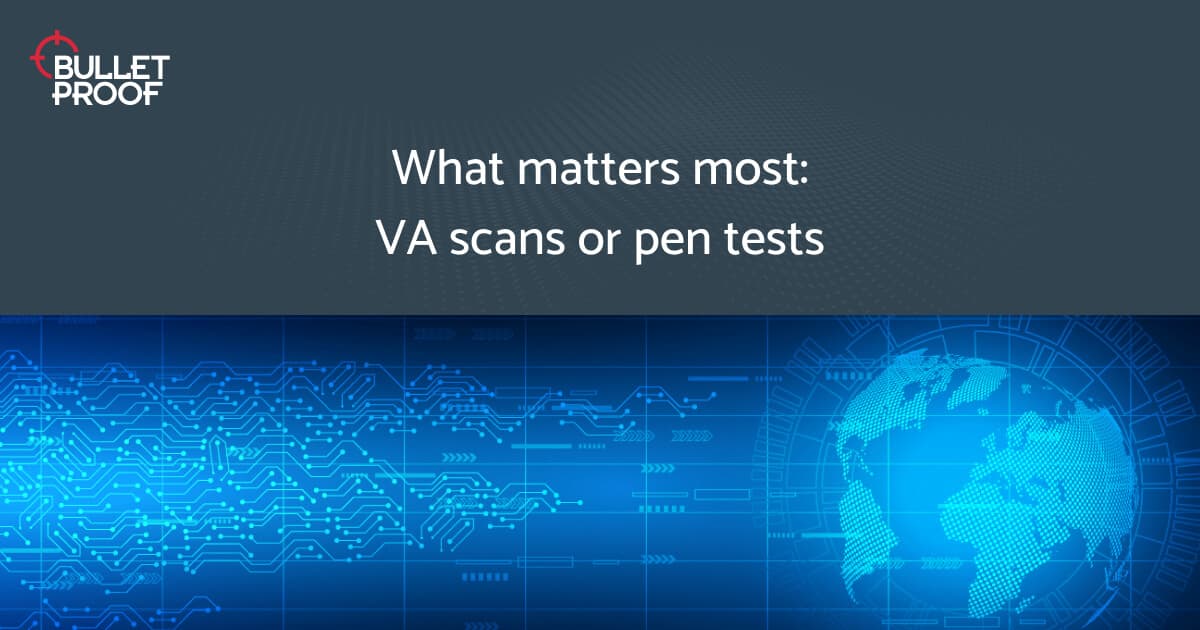Five top tips For booking a penetration test
Our penetration testers find they often uncover issues before the test has even started, so here's some top tips on how to get ahead when booking a test

Introduction
The objective of a ' good penetration test ' is to help a company improve their security which, ultimately, comes down to planning. Bulletproof’s penetration testers want each and every client to get the most out of their test. With this in mind, they have offered up some helpful tips worth thinking about when booking a security review.
Share this Article
Treat a penetration test like buying a sandwich
This doesn’t mean you get to eat your penetration tester, though they’re often so dedicated they’ll probably allow this. What they mean is, a penetration test can be a varied thing. When one walks into a sandwich shop and requests a sandwich, they instigate a chain of questions ‘what would you like in said sandwich? Would you like butter? Any salad? Any sauce?’ and so on. Just ask anyone who’s been to Subway. When scoping a penetration test, work out what you want to achieve. Do you want an element of social engineering? A red team test? Is it an infrastructure or application pen test? Authenticated or unauthenticated? What needs to be in scope? Etc.
Think about what you have
Know what assets you have in play. Getting this bit wrong can cause a lot of issues later on in a test. If our tester finds a critical issue on a specific server and phones you up to resolve it, only to find that you don’t know what they’re talking about and have no idea where this server sits or what’s running on it, then this is going to eat up a lot of testing time. Similarly, if you don’t know how many desktops or laptops you have or who they are assigned to, this can cause complications.
Set the right scope
I shall write this as it was once given to me in an email: “NOTHING IS OUT OF SCOPE FOR AN ATTACKER!!!” Yes, that’s three exclamation marks. It’s fairly common for people to want to test only a certain aspect of their infrastructure. This is typically because a business has limited resources and wants to focus on what they view as 'the important parts'. Also, it might not make sense to test literally everything.
This is something of a double-edged sword. Whilst testing absolutely everything could be wasteful, not testing enough could be a fatal (for your business) error. Setting a scope that’s too limited means that your security isn’t really tested at all. Whilst the handful of servers or machines tested may be deemed secure, that Exchange server you deemed out of scope (or forgot about) may be riddled with vulnerabilities that could bring everything down.
This can be particularly important if you have a number of remote workers. It’s harder (though not impossible) to enforce tight controls on assets not in the office, particularly if you operate a BYOD policy. So, if that VPN and the related firewalls aren’t included in your scope, then there will be problems.
Do basic hardening yourself beforehand
If you’ve got a server in your organisation that was configured by the apprentice just clicking next over and over before heading to lunch, or have been rather lax on pushing out updates, sort these out first. Whilst cyber security firms might be happy to take your money on these occasions, there is very little to gain from booking a penetration test when you already know there'll be lots of issues that are easy to solve. This will simply suck up the time allocated for the test, which could be better spent seeking out those harder to discover vulnerabilities.
Let us take our time
This is more important for those with a large or complex infrastructure. If that’s you, it’s worth allocating the time and resources for a ‘proper pen test’. Hackers have no time limits. They can take as long as they like targeting your network and changing their approach. It would therefore be counterproductive to restrict a penetration test to a handful of days. It would force a tester to rush through a large number of attacks or do a thorough job on just a few. Either way, it really limits just how useful the end result will be.
Whilst booking a longer test will be more expensive, you’ll certainly get more out of it. The longer a penetration tester has to assess a network, the more thorough they can be, and the more flaws they can find. The more flaws they find, the more secure your systems will be. Whilst we know one never ending pen test is not at all feasible, the longer one lasts, the better.
In Summary
Our pen testers are good at what they do, and more importantly, they like doing it. They’re passionate about security, which is why they get so riled up when I ask them about common flaws and weaknesses. They want our customers to get the most from their services, so they make sure they get everything right from the very beginning. Thorough planning and scoping will mean you’ll certainly get a ‘good penetration test’.
So, when you need a security review, follow our testers’ tips and see if you can avoid the common pitfalls. If you do, then they’ll sleep happy at night, dreaming cyber-security dreams.

10 Steps to Cyber Security
Find out how to secure your business in 10 steps with our free best practice infographic.
Download nowRelated resources
Get a quote today
If you are interested in our services, get a free, no obligation quote today by filling out the form below.














